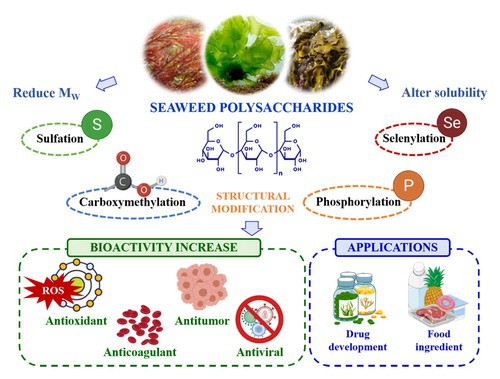We use cookies to understand how you use our site and to improve the overall user experience. This includes personalizing content and advertising. Read our Privacy Policy
The carbohydrates of seaweeds (e.g., fucoidan, agar, agarose, and carrageenan) are one of the main metabolite groups, and their chemical composition and structural characteristics are highly variable, as well as being the most distinctive of the three seaweed groups. Here, Lifeasible offers professional solutions for the identification of seaweed carbohydrates.
Of all algae, the carbohydrates present in seaweeds are, on average, equivalent to approximately 50% of the dry algal mass. Seaweeds may contain free simple carbohydrates, such as Mercuria, which contain high amounts of the alcoholic sugar mannitol. Still, they are mainly polysaccharides that are not degraded by mammalian enzymes, which means that dietary fibers such as fucoidan, alginate, agar, and carrageenan also have low calorific values. These carbohydrates exhibit a wide range of biological properties, including anti-inflammatory, immunostimulatory, antioxidant, anti-coagulant, anti-viral, anti-proliferative, and anti-tumor properties, play a very important role in human health. Seaweed carbohydrates are currently being exploited extensively in industry for their physicochemical and biological properties.
 Fig 1. Emerging extraction technologies, chemical modifications and bioactive properties of seaweed polysaccharides. (Otero P, et al., 2021)
Fig 1. Emerging extraction technologies, chemical modifications and bioactive properties of seaweed polysaccharides. (Otero P, et al., 2021)
Seaweeds are one of the promising natural sources for obtaining bioactive carbohydrates. Our scientists have a broad interest in the bioactivity of seaweed polysaccharides and their use in biomedical, functional food, and technological applications. We aim to develop profitable methods to obtain polysaccharides from seaweed with improved yields and quality. Lifeasible offers a comprehensive service for identifying seaweed carbohydrate to customers worldwide.
We develop customized processes to obtain carbohydrates from seaweed in large quantities and with high purity.
The structure of seaweed polysaccharides is complex, with the main monomers being galactose, rhamnose, xylose, caramel, and glyoxylate. We offer specialized methods to clearly analyze their composition, such as Fourier Transform Infrared (FTIR) spectroscopy, High Performance Liquid Chromatography (HPLC), multi-angle laser scattering (mall), and Nuclear Magnetic Resonance (NMR) spectroscopy. Our service helps you to obtain the complete sequence of the molecule, and each oligosaccharide is fully characterised.
We perform molecular modifications of algal polysaccharides by means of enzymes or chemical reagents, thus changing the structure, molecular weight, type, number, and position of substituents of algal polysaccharides and thus their biological activity.
Lifeasible provides a comprehensive service for identifying seaweed carbohydrate to purify, structurally characterize and chemically modify seaweed polysaccharides. We are your trusted partner in all aspects of seaweed research. If you are interested in our solutions, please do not hesitate to contact us.
Reference
Get Latest Lifeasible News and Updates Directly to Your Inbox
Mechanisms Regulating Plant Chloroplast Biogenesis
April 15, 2025
We use cookies to understand how you use our site and to improve the overall user experience. This includes personalizing content and advertising. Read our Privacy Policy